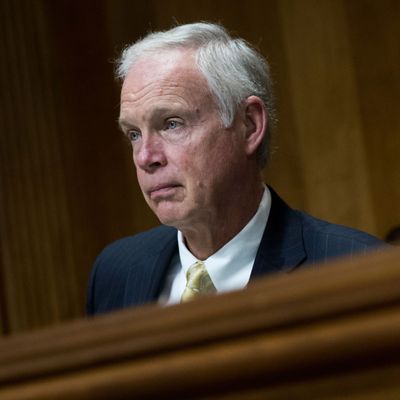
Last month, Ron Johnson learned that the phrase “secret society” appeared in a text message that one FBI employee sent to another FBI employee — and that the latter G-man had both worked on the bureau’s Russia investigation and (privately) expressed a negative opinion of Donald Trump in 2016.
From these facts, the Wisconsin senator concluded that we were witnessing the “corruption of the highest levels of the FBI,” telling Fox News, “The secret society — we have an informant talking about a group that was holding secret meetings off-site.”
Less than 48 hours later, ABC News published the illicit text message in its entirety: “Are you even going to give out your calendars? Seems kind of depressing. Maybe it should just be the first meeting of the secret society.” (The “calendars” apparently referred to a “Vladimir Putin-themed gag gift.”) Johnson then conceded that there was “a real possibility” that the whole “secret society” thing might have been a joke. The senator’s attempt to foment a conspiracy theory about a cabal of left-wing subversives in the FBI had fallen apart faster than a Jenga tower.
Nevertheless, he persisted. And on Wednesday, Johnson published a 25-page report, analyzing the harrowing implications of a larger body of text messages between the aforementioned FBI employees — (now former) investigative agent Peter Strzok and bureau lawyer Lisa Page.
President Trump was thrilled with Johnson’s findings.
One of the report’s biggest “bombshells” was an exchange in which Page and Strzok discussed talking points for then–FBI director James Comey to share with Barack Obama. “Potus wants to know everything we’re doing,” Page wrote.
Johnson concluded that this message raised troubling questions about “the type and extent of President Obama’s personal involvement” in the investigation of Hillary Clinton’s email server. (Ostensibly, a president asking the FBI director point-blank to drop an investigation into his friends, while saying publicly, over and over, that he expects the Justice Department to put loyalty to him over the letter of the law is fine, in Johnson’s book — but a president asking to be briefed on an ongoing investigation involving a political ally is a threat to the rule of law.)
Hours later, The Wall Street Journal revealed that this did not, in fact, raise any such questions:
[A]ssociates of Mr. Strzok and Ms. Page said that exchange referred to the president’s wanting information on Russia election meddling, which the FBI was heavily involved in over that period. That exchange occurred just days before Mr. Obama met Russian President Vladimir Putin at a summit in China. Mr. Obama said in December 2016 that he had addressed the issue of tampering with the election process with Mr. Putin at that September meeting.
In August and September 2016, the FBI was no longer actively investigating the Clinton matter, after Mr. Comey had said that July that he was recommending no criminal charges be filed.
In casting spurious aspersions about subversion at the highest level of the federal government, Johnson has earned comparisons to another, historically infamous Wisconsin senator. But such analogies are deeply unfair — say what you want about Joseph McCarthy, at least his conspiracy theories had a shelf life longer than an open container of guacamole.






























